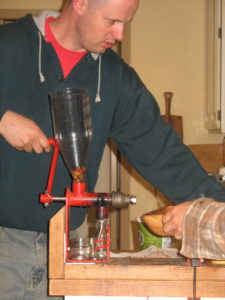Pressing Acorns into Oil
Matt has been dreaming and scheming about making acorn oil for the last several years. The oil is used traditionally in Spain and Morocco, and he was curious what kind of oil we could get from our local oak varieties. He finally bought an oil press this winter, determined to see what we can draw from our local and abundant acorn supply. His first run with this hand-press did not work so well, so he invited his Buckeye friend Stephen to come over and share his oil pressing experience.
The hand press definitely requires some finesse! But once Stephen and Matt got it going, a scrumptious roasted nut smell filled the air and beautiful golden oil became dripping out. The first batch was made with Canyon Oak acorn (moderate in tannins). I tasted a few drops and it was like golden nutty melted butter! It was hard to taste it without making some noise about how yummy it was.
As I type, Steven and Matt are continuing to press acorn oil using a few different acorn varieties, Tan Oak and Black Oak. They comment on each flavor as if they were in Napa tasting wine. They also chat about the nature of the world, and every now and then interject with a “now we got it!” or “here we go!” or “that is SWEET” when the oil comes dripping out in a nice flow. They talk about the ease in which we go to the store and buy a large container of cooking oil, and what would happen if for some reason that supply was no longer available to us so abundantly.
The Tan Oak (Lithocarpus densiflorus) is said to have the most oil (30%), but also has high tannins. Tannins or tannic acid is present in our diets in small amounts (that slight pucker you may get from eating walnuts, cranberries or pomegranates) but in acorns it is so high that you must leach it out. Luckily tannins are water-soluble and the leaching process will produce nut meats without the bitterness. Tannins are nature’s preservatives and the acorns with high amounts can be stored for a longer period and most plants and trees have them to help protect them from insects, fire and bacteria.
Knowing that Canyon oak has moderate tannins we decided to not leach the acorn before pressing the oil out and to our luck they did not taste bitter! The Tan Oak however did have some bitterness to it. So we added water to the oil and decanted it off, hopefully “leaching” the tannins away—It worked somewhat – more experiments are needed.
I must admit, it sure is handy going to the store (or someplace like Chaffin Farms) to buy a large bottle of oil to use generously for every meal. Matt and Steven have been working at this oil pressing for several hours today and we have about 4 ounces of oil to show for it. Sure, some of this time was experimentation with trial and error, but you get my point about the time involved to press this precious oil by hand!
But I must say…. taking an afternoon to explore the treasures of our local food shed and build community around processing food is like nothing you can buy at the store. And the deep appreciation we have for every drop of that precious oil is nothing we could have experienced had we purchased it from someone else. And this is amazing acorn oil! It is made from the essence of our bioregion, rich in nutrients and indigenous to this land.
We have much more experimentation to do to on the processing of acorn oil, but we are excited to have begun the process!
One comment on “Pressing Acorns into Oil”
Comments are closed.







I was just wondering what the best way to leach the tannin would be
before pressing for the oil. Hot water would loose alot of the oil.
can this be done another way?
can the be leached as a whole acorn with the shell removed?
thank you.
Richard